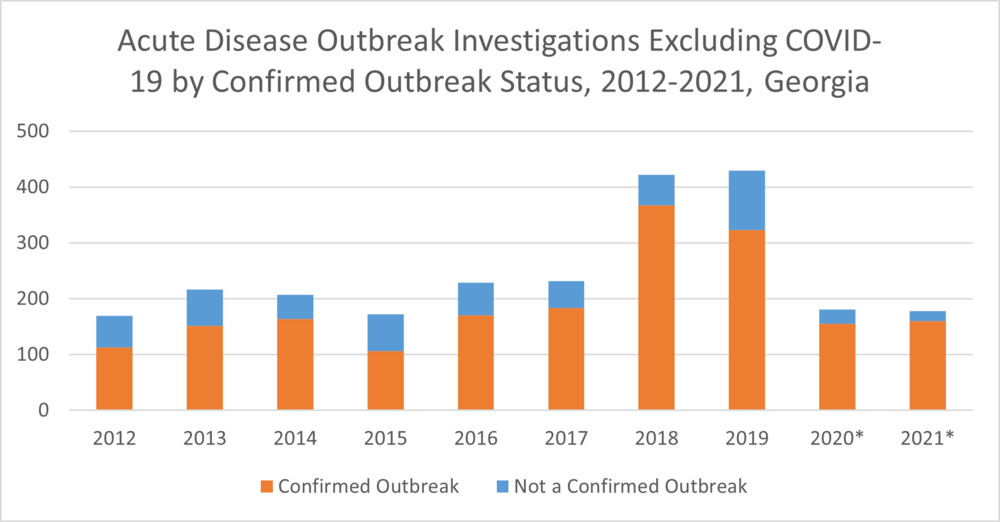
Outbreak Investigations
Outbreak Basics
An outbreak is more cases of a particular disease or set of symptoms in a specific time and place than would be expected. Diseases can be spread many ways and some may cause outbreaks. Disease spread can be through direct contact with another sick person, contact with droplets from an infected person, airborne transmission when infectious particles are suspended in the air, transmission via a vehicle like food, water, blood, or fomites (inanimate objects like countertops, doorknobs, or bedding), or vector borne transmission via insects, like mosquitoes, fleas, or ticks.
While all reported clusters of disease or outbreaks are investigated, not all are solved. Sometimes outbreaks end before health officials are able to collect enough information to determine a possible source of the infections.
Georgia Department of Public Health epidemiologists are responsible for all outbreaks that occur in Georgia as well as all Georgia residents included in outbreaks that occurred outside of Georgia.
Outbreak Investigations
Georgia Department of Public Health epidemiologists follow the
10
steps of an outbreak investigation
during cluster and outbreak investigations.
Outbreak Investigators
Epidemiologists, laboratorians, and regulators all play important roles in outbreak investigations.
Epidemiologists
In Georgia, epidemiologists are located in each of the 18 health districts and at the state health department. They work as “disease investigators” to try to determine what could have caused the outbreak.
Laboratorians
The Georgia Public Health Laboratory supports testing to try to determine what could be causing each outbreak. Clinical and commercial laboratories send notifiable disease results to the Georgia Department of Public Health submit some requested specimens to the Georgia Public Health Laboratory for further testing and outbreak detection.
Regulators
Regulators support outbreak investigations by ensuring that facilities where outbreaks have occurred follow regulations to end current outbreaks and prevent future outbreaks. Regulators are specific to the type of facility that is having the outbreak. For example, Georgia Department of Public Health county Environmental Health offices regulate restaurants in each county, the Georgia Department of Agriculture regulates grocery and convenient stores, and the Georgia Department of Community Health regulates healthcare facilities.
The Public
The public plays the most important role by reporting clusters or outbreaks to local public health. This may be a healthcare provider who notices more people sick with the same thing than she would expect, a group of people who report getting sick after a meal out, a parent at a daycare where kids are sick, and so many others. Without these reports, outbreaks and clusters would go uninvestigated and may happen over and over again.
Multi-State Foodborne Outbreaks
Georgia Department of Public Health epidemiologists work with epidemiologists from the Centers for Disease Control and Prevention (CDC) to investigate clusters and outbreaks that include Georgia residents. For more information on multi-state foodborne outbreak investigations, see this CDC website.
https://www.cdc.gov/foodborne-outbreaks/
Outbreak Statistics for Georgia
While all clusters are investigated, not all are confirmed outbreaks. COVID-19 outbreaks far outnumbered other acute disease outbreak investigations during 2020-2021. Approximately 4300-5500 COVID-19 outbreaks were reported per year during 2020-2021.

Page updated 12/30/2022